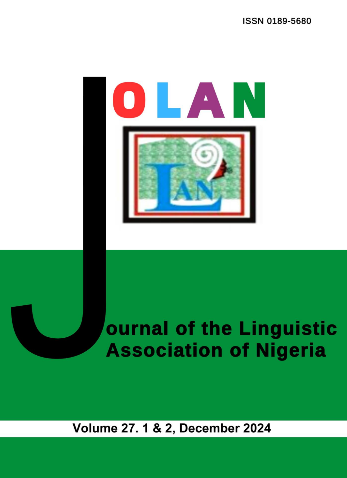Focus as an aspect of grammatical relation in Edo
Keywords:
Information Structure, Grammatical relations, Subject-object switch, Focus, Ẹdo languageAbstract
Languages possess a rich repertoire of strategies for conveying information and this is an aspect of the grammar of a language that has generated a lot of interest from scholars of diverse fields in contemporary times. The conceptual focus is associated with the ways and means of packaging information. It is concerned with how the immediate communicative needs of speakers of a language are satisfied under a particular context or discourse setting. Extant studies in the language have viewed focus as a syntactic derivation that is simply expressed for emphasis without recourse to its underlying structure and role in grammatical relations. This study provides an insight into the nature of grammatical relations in Ẹdo, a Kwa language spoken in the South-Southern part of Nigeria. Data for the study were solicited by way of recorded utterances of the speakers of the language and the isolation of instances of emphasis by the researcher (who is competent in the Ẹdo language). The isolated elements of the recorded discourses were examined descriptively with a view to understanding the nature of focus marking. The study shows that information is packaged in a variety of ways in the language which reflects the communication strategies of the Ẹdo people. The study argues for Focus as an important aspect of the nature of grammatical relations in the language and demonstrates how it functions in satisfying the immediate communicative needs of the language speakers.
Abstract in Edo
Unu ẹvbo keghi mwẹ edọmwadẹ odẹ ne a ya gie uhunmwu ne ọre abọ ọghe ilele unu ẹvbo ne avbe ọgbẹn-ebe ughughaẹn ru ẹmwẹ ọnrẹn. Ọ keghi kaan edọmwadẹ odẹ ne a ya mwamwa itaemwi. Ọ vbe kaan evbe ne itaemwi emwa ni loo unu ẹvbo vbe ya de ye uviẹn vbe edọmwadẹ ẹbu ne ọ de yi. Iruẹmwi ne a ka gha miẹ keghi guan kaan ẹmwẹ ne a tua ta vbe ekpa esintasi vbene iran ma na guan kaan avbe emwi ni rre otọ ọre. Iruẹmwi na keghi guan kaan ilele unu ẹvbo vbe Ẹdo ne a zẹ vbe ọtọ Enaigirria vbe ẹgbẹ unu ẹvbo ekua. Emwi ne a loo vbe ebe na keghi ke obọ avbe ivbi ẹvbo ni loo unu ẹvbo Ẹdo rre vbene a na vbe gbe aro ke otọ ya hannọ avbe ẹmwẹ ne a tuare ladian. Iruẹmwi na keghi rrie ma wẹẹ odẹ ughughan ẹre ivbi Ẹdo ya kuun itaemwi vbe ifiẹmwẹ. Ebe na keghi vbe ya ẹre nyanya wẹẹ ẹmwẹ ne a tua vbe unu ẹvbo ẹre ivbi ẹvbo ya gu egbe guan kevbe ya rẹẹn emwi ne edọmwadẹ ọmwa guan kaan.
References
Agheyisi, R. (1986). An Ẹdo-English dictionary. Ethiope Publishing.
Aigbedo, W. I. (2022). The Ẹdo guilds as agents of language purification. Iden: A Journal of Ẹdoid Studies, 1(1), 11-18.
Akintoye, O. S. & Ariyo, O. O. (2015). Focus constructions and high tone syllable Ó in Ekiti dialect of Yoruba: A critique. International Journal of Current Research, 7(2), 12960-12965.
Amayo, A. (1975). The structure of verbal constructions in Ẹdo (Bini). Journal of West African Languages, 10(1), 5-27.
Baker, M. C. & Stewart, Osamuyimen T. (1999). Verb movement, objects and serialization. North-East Linguistics Society. GSLA.
Baker, M. C. (2004). Lexical categories: Verbs, Nouns and Adjectives. Cambridge University Press.
Black, A. C. (1998). A step-by-step Introduction to the Government and Binding theory of Syntax. University of North Dakota: SIL.
Bresnan, J. (2001). Lexical-Functional Syntax. Blackwell.
Chomsky, N. (1981). Lectures on Government and Binding. Foris Mouton.
Chomsky, N. (1986). Barriers. MIT Press.
Dixon, R. M. W. (2009). Basic Linguistic Theory: Grammatical Topics. Oxford University Press.
Dryer, M. S. (1997). Are Grammatical Relations Universal? In: J. Bybee, J.Haiman, & S. A. Thompson (Eds.), Essays on language function and language type. (p. 117-143).
John Benjamins. Hammadi, I. O. & Aziz, M. J. (2012). Grammatical Relation Extraction in Arabic. Journal of Computer Science, 8(6), 891-898.
Kreps, C. (1996). Dependency, licensing and the nature of grammatical relations. UCL Working Papers in Linguistics, 8, 1-37.
Imasuen, O. (1996). Ẹdo Course for Schools and Colleges. Books 1-3. Aisiẹn Publishers.
Marantz, A. (1984). On the Nature of Grammatical Relations. MIT Press.
Obiamalu, G. (2013). The functional category D in a language without determiners: The case of Igbo. SKASE Journal of Theoretical Linguistics, 10(2), 50-67.
Ọmọrẹgbẹ, E. (2012). The basic clause: A morpho-syntactic analysis. Ph.D thesis, University of Benin.
Ọmọruyi, T. (1986). Adjectives and adjectivalization processes in Ẹdo. Studies in African Linguistics, 17(3), 283-302.
Ọmọruyi, T. (1989). Focus and question formation in Ẹdo. Studies in African Linguistics. 20(3), 283-302.
Ọmọzuwa, V. E. (2010). Edo Phonetics and Phonology. Ambik Press.
Osuagwu, E. & Anyanwu, O. (2020). Aspects of Syntactic Focus Constructions in Igbo. California Linguistic Notes, 42(1), 1-23.
Primus, B. (2009). Case, grammatical relations, and semantic roles. In A. Malchukov & A. Spencer (Eds.), The handbook of case (pp. 261-275). Oxford University Press.
van Valin, R. D. (1981). Grammatical Relations in Ergative Languages. Studies in Languages, 5, 361-394.
Yusuf, O. (1989). The derivation of the focus constructions in Yoruba: A problem for the trace theory, Journal of Linguistic Association of Nigeria 5(1), 56-68.














